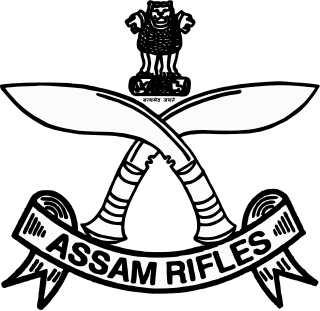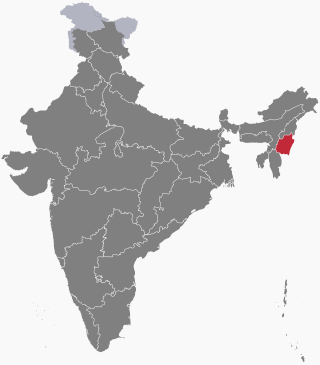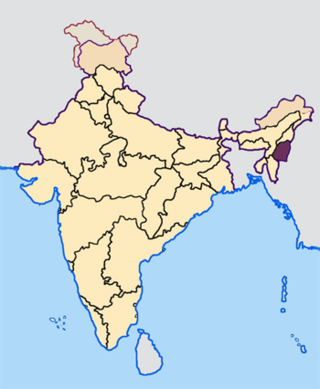
The Assam Rifles (AR) is a central paramilitary force responsible for border security, counter-insurgency, and maintaining law and order in Northeast India. Its primary duty involves guarding the Indo-Myanmar border. The AR is one of the Central Armed Police Forces (CAPF) administered by the Ministry of Home Affairs. The Indian Army maintains operational control of the AR. As a police force, its recruitment, perks, promotions, and retirement policies are governed by CAPF rules. Approximately 80 percent of the officers are deputed from the Army, while the remaining personnel are drawn from the AR cadre. The AR is commanded by the Director General of the Assam Rifles, who is appointed by the Ministry of Home Affairs.
Armed Forces Act (AFSPA), 1958 is an act of the Parliament of India that grants special powers to the Indian Armed Forces to maintain public order in "disturbed areas". According to the Disturbed Areas Act, 1976 once declared 'disturbed', the area has to maintain status quo for a minimum of 3 months. One such act passed on 11 September 1958 was applicable to the Naga Hills, then part of Assam. In the following decades it spread, one by one, to the other Seven Sister States in India's northeast. Another one passed in 1983 and applicable to Punjab and Chandigarh was withdrawn in 1997, roughly 14 years after it came to force. An act passed in 1990 was applied to Jammu and Kashmir and has been in force since.

The Insurgency in Northeast India involves multiple separatist militant groups operating in some of India's northeastern states, which are connected to the rest of India by the Siliguri Corridor, a strip of land as narrow as 14.29 miles (23.00 km) wide.

Terrorism in India, according to the Home Ministry, poses a significant threat to the people of India. Compared to other countries, India faces a wide range of terror groups. Terrorism found in India includes Islamic terrorism, separatist terrorism, and left-wing terrorism India is one of the countries most impacted by terrorism.

The Khalistan Liberation Force (KLF) is a Khalistani separatist militant organization based in the Indian state of Punjab. Its motive is the creation of a sovereign Sikh state called Khalistan via armed struggle. The KLF is one of the key fighting forces of the Khalistan Movement. It was responsible for assassinations, abductions and military engagements with the Indian Armed Forces during the Insurgency in Punjab. The KLF is listed as a designated terrorist group by India.

The National Socialist Council of Nagaland (NSCN) is a Naga nationalist and separatist group operating mainly in Northeast India, with minor activities in northwest Myanmar (Burma). The main aim of the organisation is to establish a sovereign Naga state, "Nagalim", which would consist of all the areas belonging to the Naga people in Northeast India and northwest Myanmar.

The People's Liberation Army of Manipur, often shortened to just People's Liberation Army, founded by N. Bisheshwar Singh on 25 September 1978, is a separatist group fighting for a separate independent socialist state of Manipur, a state in northeastern India.

The Zomi Revolutionary Army is an armed Zomi nationalist insurgent group formed in 1997, following an increase in ethnic tensions between the Kuki people and the Paites tribe in Churachandpur district of Manipur, India. Its parent organisation, the Zomi Revolutionary Organisation, was founded in April 1993. Pu K Guite, a Zomi leader from Karbi Anglong, is the founder president of the organisation. It is one of the most powerful group operations in Manipur.

Greyhounds is a police special forces unit of the Andhra Pradesh and Telangana Police departments in India. Greyhounds specialises in counter-insurgency operations against Naxalite and Maoist terrorists.

Colonel D. Sreeram Kumar AC is a serving Indian Army officer who was decorated in 2010 with the Ashoka Chakra, India's highest peacetime gallantry decoration.
Secession in India typically refers to state secession, which is the withdrawal of one or more states from the Republic of India. Whereas, some have wanted a separate state, union territory or an autonomous administrative division within India. Many separatist movements exist with thousands of members, however, some have low local support and high voter participation in democratic elections. However, at the same time, demanding separate statehood within under the administration of Indian union from an existing state can lead to criminal charges under secession law in India. India is described as a ‘Union of States’ in Article 1 of the Indian constitution I.e indestructible nation of destructible states where a state or Union territory of India can't secede from India by any means.

Human rights abuse is an ongoing insurgency in Manipur, a northeastern Indian state. The issue started in the 1960s due to a separatist conflict. Insurgent groups kidnapped children to train them as child soldiers against the Indian government. Manipur was declared a “disturbed area” by the Indian government in 1980 in the Armed Forces Special Powers Act of 1958.

The Insurgency in Manipur is an ongoing armed conflict between India and a number of separatist rebel groups, taking place in the state of Manipur. The Insurgency in Manipur is part of the wider Insurgency in Northeast India; it combines elements of a national liberation war as well as an ethnic conflict.
On 9 June 2015, India conducted a cross-border strike code name Operation Hot Pursuit against insurgents belonging to NSCN-K. According to India, the operation took place in Myanmar and it was in response to ambush of Indian Army convoy of 6 Dogra Regiment in Chandel district of Manipur. Indian officials said that they had crossed the border and inflicted significant casualties against the NSCN-K. According to Indian media reports, around 38 insurgents belonging to NSCN-K were killed during the operation. The operation lasted around 40 minutes.

Shangwang Shangyung Khaplang was a Burmese leader of Naga ethnicity. He was the leader of the NSCN-K, an insurgent group that operates to establish a Greater Nagaland, a sovereign state bringing all Naga-inhabited areas of Myanmar and India under one administrative setup.
This is a timeline of the Insurgency in Northeast India, an ongoing armed conflict between the separatist rebels and the Indian government.
The 2020 Amshipora murders, or the Amshipora fake encounter, or the Shopian fake encounter, refers to the killing of three Kashmiri laborers, one of whom was a minor, by Indian military personnel of the Rashtriya Rifles in the village of Amshipora, in the district of Shopian, in Jammu and Kashmir, on 18 July 2020. The Indian Army initially claimed that the three victims were foreign terrorists who had been killed in an encounter with security forces after they opened fire on a security team. Preliminary investigations by the Indian Army in a Court of Inquiry, as well as by the Jammu and Kashmir Police, alleged that Army personnel, aided by civilian informants, had staged the encounter and killed three labourers who were working for daily wages in local orchards, allegedly to claim a cash bounty of ₹20 lakh, which is granted by the Indian Army as a reward for killing militants. The Indian Army is currently conducting a court-martial proceeding against Army Captain Bhoopendra Singh of the Rashtriya Rifles, as well as a unnamed non-commissioned officer, while proceedings are ongoing against two civilian informants in local courts in Kashmir.
Kishori Mohan Tripathi was an Indian politician and member of the Constituent Assembly of India from the Central Provinces.
G Bidai is the Commander and Vice-president of the militant outfit National Democratic Front of Boroland (NDFB). He is on the National Investigation Agency's (NIA)'s most wanted list, a primary counter-terrorist task force of India, with a bounty of Rupess 0.5 Million.












